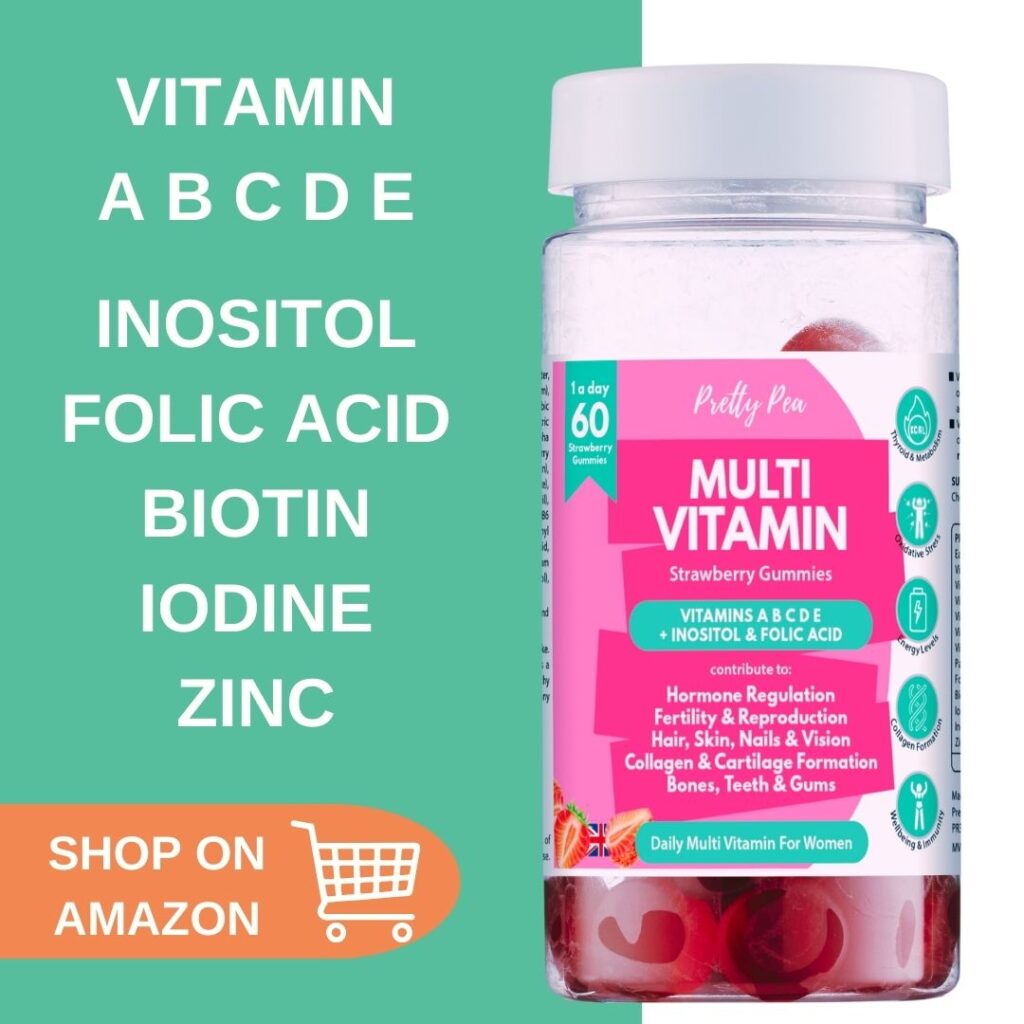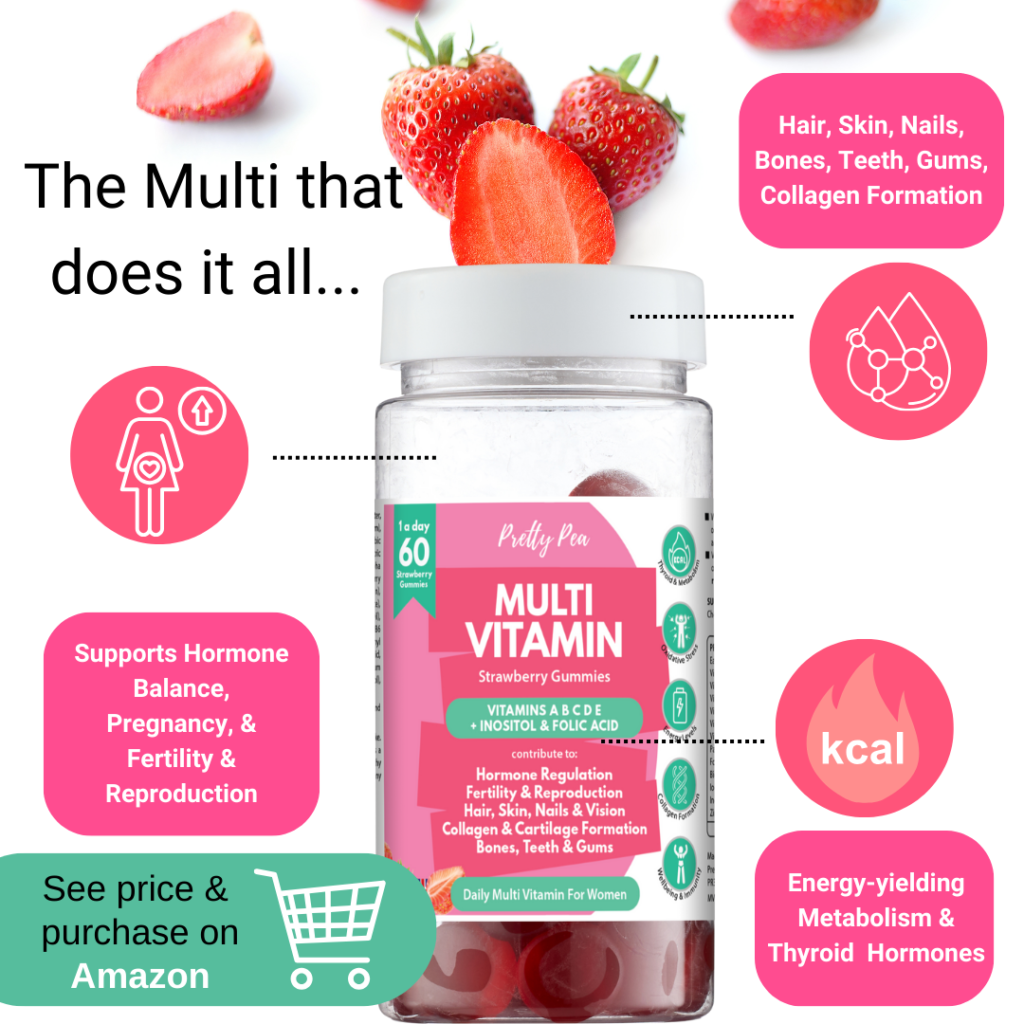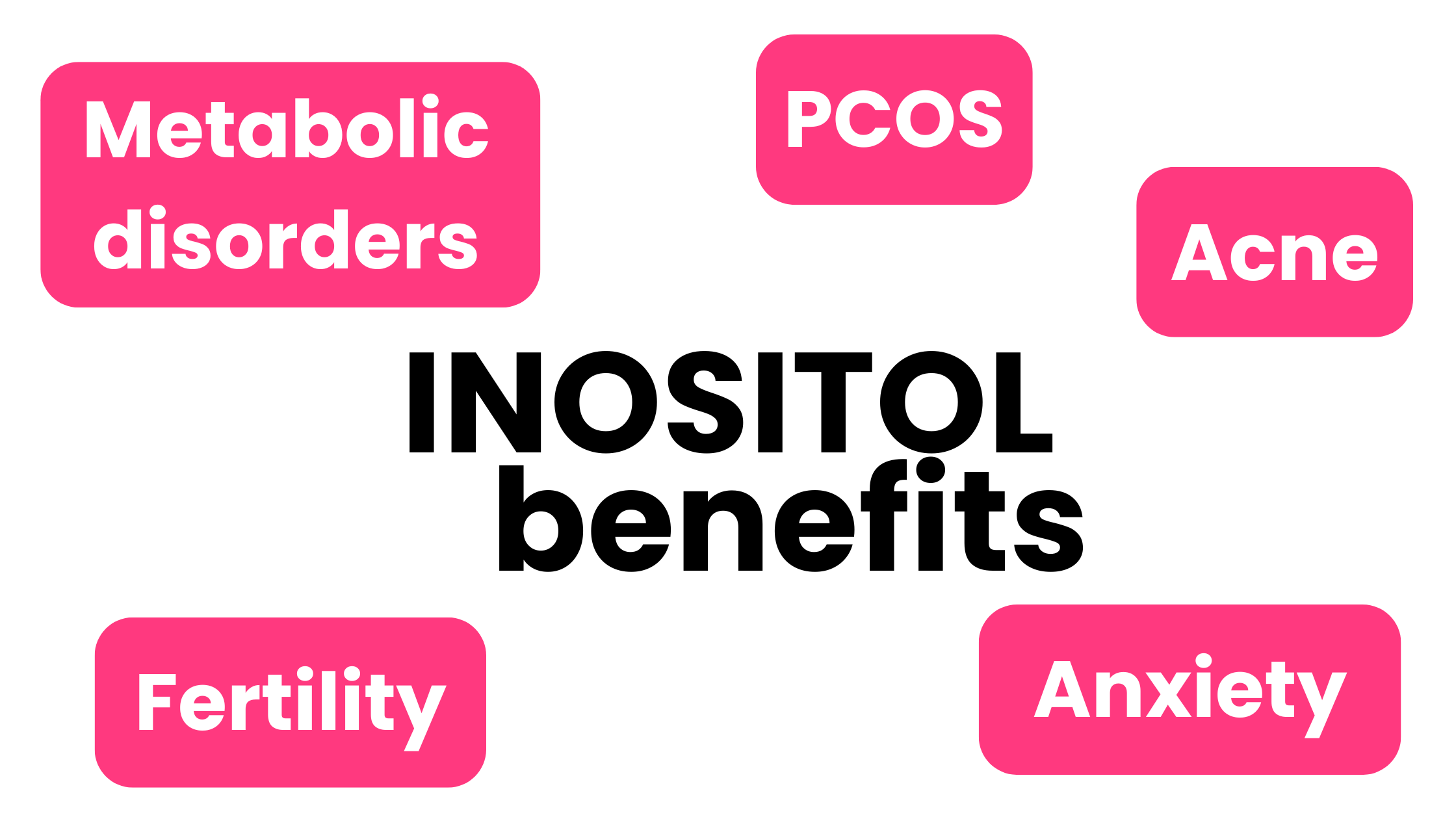A Comprehensive Guide to Inositol, it’s Role in the Body, Benefits, and Dosage for Women
Inositol, often referred to as a vitamin-like substance, is a naturally occurring compound found in many foods. Despite being widely grouped with the B-vitamins, it is technically a type of sugar, contributing to cellular health.
Inositol plays a crucial role in various biological processes, including cell membrane formation, neurotransmitter signalling, and insulin regulation.
Here we share what inositol is, its role in the body, its specific benefits for women’s health, and the appropriate dosage and safety considerations.
What is Inositol?
Inositol is a type of carbohydrate that is present in small quantities in many foods like fruits, beans, grains, and nuts.
It is often classified into different forms (isomers), with myo-inositol and D-chiro-inositol being the most biologically significant.
- Myo-inositol is one specific form of inositol – it’s the most abundant in the body.
- Myo-inositol helps with the activation and use of substances and hormones.
- D-chiro inositol is involved in storage and synthesis.
It was once considered part of the B-vitamin complex (sometimes referred to as Vitamin B8), but due to its ability to be synthesized in the body from glucose, it no longer holds that classification.

What Does Inositol Do in the Body?
Inositol is essential in multiple processes in the body:
1. Cell membrane structure: It is a critical component of phospholipids, which are vital for healthy cell membranes.
2. Insulin signalling: Inositol plays a pivotal role in insulin function, helping cells use glucose effectively.
3. Neurotransmitter signalling: It influences several important brain chemicals, such as serotonin and dopamine, contributing to mood regulation.
4. Fat metabolism: It supports the breakdown of fats, particularly in the liver.
Key Health Benefits of Inositol for Women
1. May Improve Polycystic Ovary Syndrome (PCOS) Symptoms
PCOS is a hormonal disorder common among women of reproductive age. It often leads to insulin resistance, irregular menstrual cycles, and infertility. Weight gain, high blood sugar and undesirable cholesterol and triglyceride levels can also be an issue. Myo-inositol and D-chiro-inositol have been shown to improve insulin sensitivity, which helps in reducing androgen levels (male hormones) and improving ovulation.
A 2016 study found that inositol supplements improved ovarian function, regulated menstrual cycles, and reduced insulin levels in women with PCOS
Inositol supplements may improve PCOS symptoms, particularly when combined with folic acid.
2. May Improve Symptoms of Metabolic Syndrome
Inositol has shown promise in improving markers of metabolic syndrome, which includes high blood pressure, high cholesterol, and insulin resistance.
By enhancing insulin sensitivity, inositol helps regulate blood sugar and lipid levels, reducing the risk of type 2 diabetes and cardiovascular disease.
3. Inositol May Have Mental Health Benefits
Inositol influences neurotransmitter pathways in the brain, which are crucial in regulating mood. Inositol may help balance these important chemicals such as serotonin and dopamine.
Research has found that some people with depression, anxiety and compulsive disorders have lower levels of inositol in their brain.
Several studies have explored inositol’s benefits in treating:
Depression
Inositol can affect serotonin pathways, potentially improving depressive symptoms. Some research suggests that inositol may be as effective as selective serotonin reuptake inhibitors (SSRIs) in treating mild to moderate depression.
Panic Disorder
In a 1995 study, inositol reduced the frequency and severity of panic attacks, comparable to the drug fluvoxamine.
Bipolar Disorder
Although research is still in its early stages, inositol has been investigated for its potential to reduce depressive episodes in people with bipolar.
4. May Improve Gestational Diabetes
Inositol may reduce the risk of gestational diabetes in pregnant women,
particularly those who are predisposed to insulin resistance, such as those
with PCOS or obesity.
A 2012 study found that myo-inositol supplements in high-risk women resulted in a lower incidence of gestational diabetes .

5. Other Potential Benefits
Inositol and Fertility
Inositol, particularly myo-inositol, has been shown to improve fertility by enhancing ovarian function and egg quality, particularly in women with PCOS.
A study conducted in 2011 demonstrated that myo-inositol supplementation improved oocyte (egg) quality, leading to better outcomes for women undergoing assisted reproductive technologies (ART).
Inositol and Acne
Due to its ability to modulate insulin and hormones, inositol has also been used to improve skin conditions like acne that are associated with hormonal imbalances.
Inositol has been found to reduce acne in women with PCOS, likely due to its role in reducing insulin resistance and balancing hormones.
A study published in 2014 revealed that myo-inositol improved skin conditions such as acne by regulating androgen levels, which are often elevated in women with PCOS.
Inositol and Weight Loss
Inositol, particularly myo-inositol and D-chiro-inositol, has been associated with reductions in body mass index (BMI) and weight in women with PCOS.
A study in 2015 demonstrated that myo-inositol supplementation led to significant weight loss in women by improving insulin sensitivity and hormonal balance.
How Much Inositol Do Women Need?
While there is no established Recommended Daily Allowance (RDA) for inositol, typical dietary intake is estimated to be between 1 to 4 grams per day.
Women, particularly those dealing with specific health conditions, may benefit from additional inositol beyond what is consumed through the diet.

Typical Dietary Sources of Inositol
Inositol is naturally present in a variety of foods:
– Citrus fruits (such as oranges and grapefruits)
– Beans and legumes
– Whole grains
– Nuts (especially almonds and walnuts)
However, the amounts in these foods are relatively small compared to the dosages used in supplements for therapeutic purposes.
Possible Side Effects and Safety
Inositol is generally considered safe, even in relatively high doses. However, some individuals may experience mild side effects, including:
– Gastrointestinal distress: Such as nausea, gas, and diarrhoea, especially at higher doses.
– Headaches: In rare cases, people may experience headaches or dizziness.
For women who are pregnant, breastfeeding, or taking medications for bipolar disorder, it’s important to consult a healthcare provider before starting inositol supplementation.
Conclusion
Inositol is a versatile and beneficial compound, particularly for women managing PCOS, mental health disorders, and metabolic syndrome. Its role in insulin sensitivity, neurotransmitter regulation, and hormone balance makes it a valuable tool in addressing various health concerns. While it is found in everyday foods, therapeutic doses often require supplementation.
As with any supplement, it’s essential to consult a healthcare professional before adding inositol to your routine, especially if you have existing medical conditions or are taking medications.

References:
[Inositol for PCOS and Fertility](https://pubmed.ncbi.nlm.nih.gov/27087023/)
[Inositol in Mental Health disorders](https://pubmed.ncbi.nlm.nih.gov/8754398/)
[Controlled trials of inositol in psychiatry] https://www.ncbi.nlm.nih.gov/pubmed/9169302
[D-Chiro-Inositol – Its Functional Role in Insulin Action and its Deficit in Insulin Resistance] https://www.ncbi.nlm.nih.gov/pmc/articles/PMC2478565
[The Efficacy of Inositol and N-Acetyl Cysteine Administration (Ovaric HP) in Improving the Ovarian Function in Infertile Women with PCOS with or without Insulin Resistance] https://www.hindawi.com/journals/ogi/2014/141020
[Gestational Diabetes and Inositol] https://pubmed.ncbi.nlm.nih.gov/22498478/)
[Myo-inositol content of common foods: development of a high-myo-inositol diet] https://www.ncbi.nlm.nih.gov/pubmed/7416064
[Myo-inositol in patients with polycystic ovary syndrome] [https://pubmed.ncbi.nlm.nih.gov/21517724/]
[Effects of a combination of myo-inositol and D-chiro-inositol on metabolic and hormonal parameters in polycystic ovary syndrome patients] [https://pubmed.ncbi.nlm.nih.gov/25592426/]
[Insulin sensitiser agents alone and in co-treatment with r-FSH for ovulation induction in PCOS women] [https://pubmed.ncbi.nlm.nih.gov/24720520/

